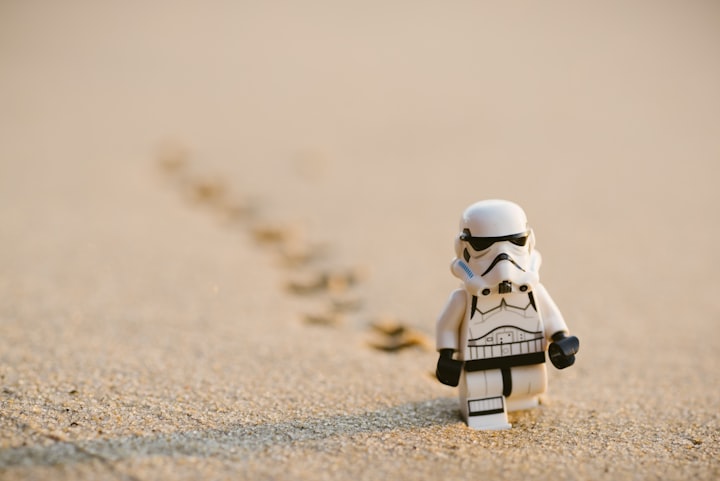How anger both protects and poisons you
Your anger has something to say

It’s 3 am and a nightmare has jolted me awake. White-hot rage stabs at my chest as the injustices of someone I called a friend roil in my belly. Their face is smug and self-satisfied as they bully me into submission, standing over me as I try to form words that die in my throat. There’s no use trying; I gave them everything they needed to hurt me. I trusted them with my greatest fears, my trauma, and my truth. But I didn’t know then how friends made the worst enemies. I didn’t know how vindictive some people were capable of being.
But that was a long time ago. They’re not in my life anymore. It was just a dream.
I try to remind myself of my neurodiversity; how being a HSP (Highly Sensitive Person) means my emotions can take me back to painful moments like they happened yesterday. But it doesn’t help. Tears sting my eyes, threatening to stain my new bedsheets, and I kick myself for letting someone who’d revel in my sadness take my power again. Granted, it was my subconscious who was the a-hole this time, but it still dragged me from sleep and forced me to remember my loss, my pain, and my utter disappointment.
And then the red-hot rage starts to stab me again.
Anger is your greatest protector

Anger has a bad reputation. It’s the emotion that puts holes in walls, bruises faces, and ruins lives. Explosive anger is a torrid, toxic beast. But I’m not going to talk about those who need anger management (or a prison cell). I’m going to talk about the slow-burn kind of anger; the kind that demands justice; the kind that tells you when you need to stand up for yourself and set boundaries.
Anger has something to say, and all too often, we shut it out because we’re told it’s poisonous and dangerous. No one ever tells you anger is right or justified, and when someone finally snaps, we submit the fallout as proof of anger’s shameful and fearsome reputation.
Not all anger has to be explosive. Not all anger has to be managed and squashed down until it bursts forth, ready to face Sigourney Weaver in an exosuit. When channelled into something more meaningful than revenge, it’s your greatest ally. It won’t let you be shamed, downtrodden, or abused. It won’t let anyone hurt you. And as long as you stoke the fires, it can fuel you for years.
Rage blankets are warm
Accountability doesn’t exist when you’re angry. Wrapped in your rage blanket, you can convince yourself you’re in the right. If nuance or humility try to snuggle their way in, they’re quickly dispersed by 300 threads of denial and 5 layers of synthetic hate. Your rage blanket doesn’t allow for anything but your own self-assurance, and it’s a warm and simple place to hide. You could live there for years, fuelled by the injustices that stitched the blanket in the first place. Many do.
Anger makes you feel powerful

If you’ve been told your temper is a problem, your short fuse will be your undoing, and unless you learn to handle your rage in better ways, it will consume you in the fires of hell, you’re not alone. However, what people don’t tell you is how anger makes you feel powerful at your most powerless. In our lowest moments – when we’re weighed down by shame and self-pity – anger holds out its righteous hand, dusts us down, and lifts our chin.
Despite my trauma, anger has always reminded me I’m worth more. ‘You don’t need this s**t,’ it’s whispered. ‘Tell them to go f**k themselves.’
Anger is also friends with my ambition. It drives my passion and need for justice, ultimately motivating my fight for a better future. When I was told I was worth little and would amount to nothing, my anger put its foot on the accelerator of self-improvement and said, ‘watch me thrive.’
My anger is a present force because it’s the only emotion that’s never made me feel weak. My fear hides behind it, hushed and silenced until I’m somewhere I feel safe enough to cry.
In short, anger is my armour.
Anger freezes people in time
Despite anger’s protective nature, it doesn’t allow for nuance. Nor does it allow for growth or introspection. It pins people to moments in time like butterflies on a board of macabre art. It doesn’t let you believe the people who harmed you are capable of nuance or growth, either. In fact, it promises you that justice is found through the bad karma they’ve undoubtedly wrought upon themselves.
However, the truth is: none of us are static. And even if the likelihood of growth is small, no one is the same as you left them. We’re all impacted by the people who walk in and out of our lives, and those who’ve harmed, wronged, or discarded us aren’t exempt from this truth. But anger doesn’t let us see the humanity in the people we hate – and especially in those who’ve directly hurt us. It defies object constancy and promises us they’re a wretched caricature of whatever stops us caring about them.
Or forgiving them.
In doing so, we rob ourselves of the chance to mourn the loss or understand the complexities that exist in each of us. It freezes people in their worst moments and refuses to believe they’re capable of more. For me, the idea that even abusive people are capable of change was an abhorrent concept. Not everyone deserves a redemption arc. Not everyone gets to pay penance and be absolved of all sin. They deserve to rot. And whether or not that’s true, the only person rotting thinking like that was me.
Anger is a uniting force

Anger and injustice go hand in hand, and when projected as a rallying cry, are a uniting force. At its best, anger leads to protest and change. If the suffragettes didn’t get angry and fight against oppression, western women would still be defined by their marriage prospects. If the LGBTQ+ community didn’t get angry and trigger the Stonewall uprising, love would not be love.
There is nothing stronger than mutual hatred. If you want to see how quickly two people can bond, give them a common enemy. Whether it’s a gaslighting ex, a flighty friend, a patronising boss, or a rude neighbour, if two people have the same negative experience with someone (or something), it’s an intoxicating high. Validation is a drug, after all. We all want to be seen and told we’re right so we can avoid the sting of accountability. But anger at its most petty and toxic will quickly burn through any foundation you think you’ve built. Nothing formed on bitterness and bile lasts.
Anger doesn’t let you move on
Anger isn’t meant to stick around. It’s not a nurturing force or an emotion you want to raise children with. The purpose it serves is supposed to be fleeting; it’s not supposed to cling to you like wet, single-ply tissue paper. When we’re stuck in the cycle of rage, we’re literally drinking poison and expecting the other person to die. It might be a rehashed cliché, but it’s true. When we spend time wishing ill on others, we lose that time wishing well for ourselves.
The target of your anger doesn’t know you’re thinking about them; it doesn’t know you sometimes wake up at 3 am on the verge of tears because a nightmare reminded you of their betrayal, and it doesn’t know you haven’t forgiven or forgotten. So, who’s really suffering?
Forgiveness isn’t about letting people off the hook. In fact, it has nothing to do with the other person. Holding onto anger, especially after it’s served its initial purpose, stops you from acknowledging the hurt and fear behind it, which is what you need to empower introspection, aid healing, and grant forgiveness so you can let go.
It’s not about replacing anger with ‘good vibes only’ and smudging sage to rid yourself of demons every time you feel a Hulk-smash stirring. It’s about accepting your anger has something to say. It’s asking you to look at why you’re full of rage so you can enact change, learn a lesson, acknowledge a wound, or better protect yourself in the future.
Anger is an anxiety response

Anger isn’t your enemy. But it’s not your friend, either. When we feel threatened or triggered, our flight or fight response manifests according to our learned behaviours. Some cut and run, others shut down, and some front it out.
It’s scary being on the receiving end of anger, which is why those of us with a ‘short-fuse anxiety response’ are often isolated during times of fear and panic. Not everyone understands or sees the nuance behind the raging inferno protecting us, and that’s neither their fault nor their issue. It’s hard to look past that kind of fire, and it’s why – unless we’re able to manage our anxiety so we don’t burn those who reach out to us – anger’s protective intentions will make sure we're alone with our pain.
Recognising the underlying triggers and expressing them with safe and loving people who want to support you is one way to douse those fires. Learning who those people are isn’t always easy, but it’s worth the investment if you want to build fulfilling relationships.
Even so, our triggers are ultimately our responsibility. Our anger is our issue, and who we choose to be vulnerable around and trust with our pain don’t owe us their time whenever we want or need it. Learning to self-soothe, seek professional help, and not emotionally ‘dump’ on others is important for healthy and non-co-dependant relationships. However, reaching out without a seven-foot fire circling you is more likely to result in the positive response you’re seeking.
Anger has something to say
We exist in a world full of complex perspectives, clashing narratives, shifting values, and dishonest players. Life isn’t always fair, just, or balanced. There are a lot of reasons to feel angry, from small-scale frustrations to large-scale atrocities, and our ability to feel deeply, think critically, and act accordingly makes hiding behind anger seem like the better option. But anger without direction is wasted energy.
Anger has something to say, and when we temper it, we control its impact. When we channel it, it fuels our fight for progress. When we listen to it, we recognise our unhealed wounds. But when we fear it, none of this is possible.
__
I hope you found this blog as useful as I did writing it. If you'd like to support my work and keep up with my latest blogs and articles, follow me on Vocal or find me on Instagram: @j.l.nicholls. #HappyReading
About the Creator
Jodi Nicholls
As a freelance content writer, fantasy author, and reluctant minion of darkness, I spend my days devouring words and teaching my cats boundaries (which is relentless, unforgiving work...)
Escapism is life. Find me on Insta: @j.l.nicholls 😊






Comments
There are no comments for this story
Be the first to respond and start the conversation.